When you’re managing international shipments, understanding the distinct roles of freight forwarders and clearing agents is crucial for streamlining your supply chain and keeping costs in check. Freight forwarders coordinate the end-to-end movement of goods, optimizing routes and handling logistics across multiple transport modes, while clearing agents focus on customs clearance and compliance, ensuring your shipments meet all regulatory requirements.
The freight forwarding market is projected to reach nearly $249.8 billion by 2034, reflecting the growing demand for efficient, technology-driven logistics solutions as global trade and e-commerce continue to expand. For your business and your customers, knowing who does what can mean the difference between smooth delivery and costly holdups.
In this article, you’ll explore the core functions of freight forwarders and clearing agents, key differences between the two, and practical tips on choosing the right partner for your shipping needs.
TL;DR
- Freight forwarders coordinate multi-modal transport and overall shipment management.
- Clearing agents focus exclusively on customs documentation, duties, and regulatory compliance.
- Freight forwarders often have a global presence; clearing agents operate locally.
- Clearing agents’ services are mandatory for every shipment crossing borders.
- Both roles are essential for timely, cost-effective, and compliant international trade.
Who is a Freight Forwarder?
A freight forwarder is a logistics expert or company that manages the end-to-end transportation of goods on behalf of businesses, ensuring efficient, cost-effective, and compliant shipping across international borders. Rather than physically moving cargo, freight forwarders act as intermediaries, orchestrating the entire process, from route planning and carrier selection to documentation and customs compliance, so your shipments reach their destination smoothly.
Freight forwarders are essential for businesses looking to minimize risk, control costs, and maintain visibility over their global supply chain. In fact, freight forwarders handle over 80% of global trade shipments by volume, underscoring their critical role in international commerce.
Key responsibilities of a freight forwarder include:
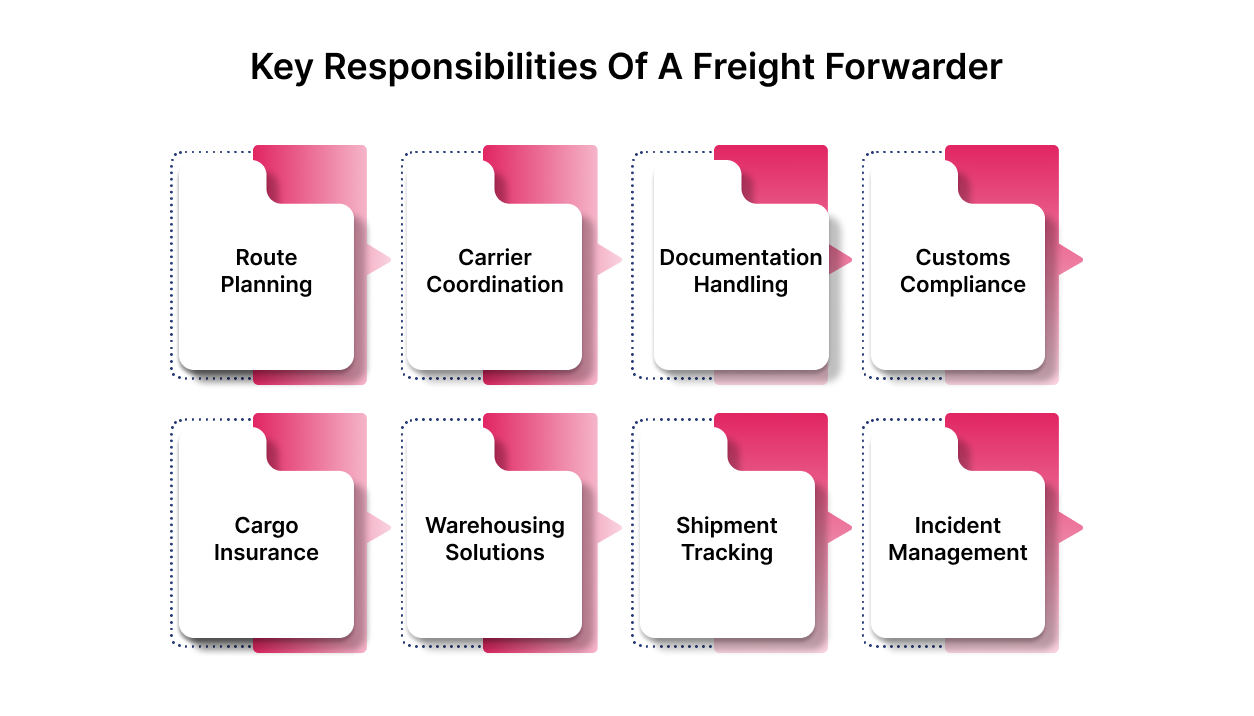
- Route planning: Selecting the most efficient and cost-effective transport routes and modes.
- Carrier and supplier coordination: Negotiating with shipping lines, airlines, and trucking companies to secure space and rates.
- Documentation management: Handling all export/import paperwork, including bills of lading, commercial invoices, and certificates of origin.
- Customs compliance: Ensuring shipments meet all regulatory requirements and arranging for customs clearance.
- Cargo insurance: Arranging insurance to protect goods against loss or damage during transit.
- Warehousing and consolidation: Providing storage solutions and combining shipments to optimize costs.
- Shipment tracking: Keeping clients updated on the status of their cargo throughout the journey.
- Managing incidents: Handling claims and resolving issues that arise during shipping.
With the freight forwarder’s expertise and global network, you can focus on your core business while they handle the complexities of international logistics.
Looking to simplify your shipping and customs clearance?
Request a quote today!Let’s take a closer look at how partnering with a freight forwarder can simplify your global shipping.
Suggested Read: What are the Duties and Responsibilities of a Freight Forwarder
What are the Benefits of Freight Forwarders?
Partnering with a freight forwarder offers your business several significant advantages that simplify international shipping and improve supply chain efficiency. Here are the key benefits:
- Cost Savings Through Volume Discounts: Freight forwarders handle large shipment volumes, allowing them to negotiate better rates with carriers. This economies-of-scale advantage translates into lower transportation costs for your business.
- Expertise in Compliance and Documentation: They ensure all customs paperwork, trade regulations, and shipping documents are accurate and compliant, reducing the risk of costly delays, fines, or shipment seizures.
- Optimized Logistics and Route Planning: Freight forwarders coordinate multi-modal transport, selecting the most efficient routes and carriers to speed up delivery and avoid disruptions caused by congestion or seasonal spikes.
- Access to a Global Network: Their established relationships with airlines, shipping lines, trucking companies, and warehouses worldwide provide you with flexible options and priority booking, improving reliability and transit times.
- Inventory and Warehousing Solutions: Many freight forwarders offer warehousing, consolidation, and inventory management services, helping you streamline storage and distribution alongside transportation.
- Risk Management and Cargo Tracking: They provide insurance options and real-time shipment tracking, giving you greater visibility and protection throughout the shipping process.
- Reduced Administrative Burden: By managing bookings, documentation, customs brokerage, and carrier coordination, freight forwarders free your team to focus on core business activities.
These benefits make freight forwarders indispensable partners in managing complex international shipments, helping your business save time, reduce costs, and improve customer satisfaction.
Want seamless coordination for your shipping and clearing needs?
Get in touch with Intoglo!Now that you know what freight forwarders do, let’s shift focus to the role of clearing agents in customs clearance.
Who is a Clearing Agent?
A clearing agent is a specialized professional or company responsible for managing customs clearance and ensuring that goods comply with all regulatory requirements when entering or leaving a country. Unlike freight forwarders who coordinate the overall transportation, clearing agents focus primarily on navigating the complexities of customs procedures, tariffs, duties, and documentation to facilitate the legal and timely release of shipments at ports or borders.
Clearing agents act as intermediaries between importers/exporters, customs authorities, and other regulatory bodies. They possess in-depth knowledge of customs laws, harmonized system (HS) codes, duty calculations, and required paperwork, which helps prevent delays, fines, or shipment seizures. Their role is critical in reducing the risk of non-compliance and ensuring smooth cargo flow.
Key responsibilities of a clearing agent include:
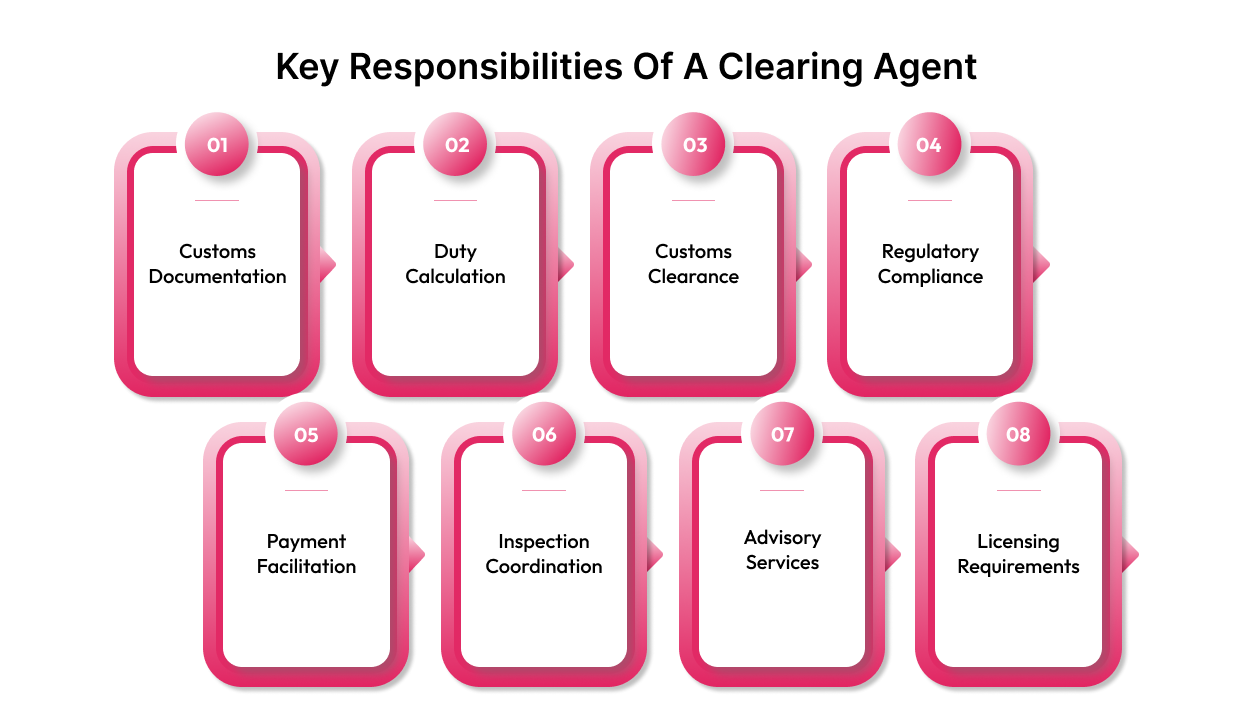
- Customs documentation: Preparing and submitting documents like the Bill of Entry, commercial invoices, and certificates of origin.
- Duty and tax calculation: Assessing applicable import duties, VAT, and other taxes accurately.
- Customs clearance: Liaising with customs officials to obtain clearance and release of goods.
- Regulatory compliance: Ensuring shipments meet all local import/export laws and standards.
- Payment facilitation: Arranging payment of duties, taxes, and fees on behalf of clients.
- Handling inspections: Coordinating inspections and addressing any customs queries or issues.
- Advisory role: Guiding businesses on customs regulations, tariff classifications, and duty drawbacks.
- Licensing and accreditation: Operating under valid clearing licenses issued by customs authorities, which often require passing exams and meeting financial criteria.
By entrusting customs clearance to a qualified clearing agent, you can avoid costly delays and focus on your core business activities while ensuring your shipments comply with all legal requirements. This expertise is especially valuable given the complex and frequently changing nature of international trade regulations.
Let’s understand why clearing agents are indispensable in the customs process. Here’s what they bring to the table.
What are the Benefits of Clearing Agents?
Clearing agents bring specialized expertise to the customs clearance process, helping your business navigate complex regulations and avoid costly delays. Their role is essential for ensuring that your shipments comply with all legal requirements and move smoothly through customs checkpoints.
Here are the key benefits of working with a clearing agent:
- Regulatory Compliance: Clearing agents stay updated on international trade laws and customs regulations, ensuring your shipments meet all legal requirements and helping you avoid fines or penalties.
- Accurate Documentation Management: They prepare and verify all necessary customs paperwork, such as bills of entry, commercial invoices, and certificates of origin, reducing errors that can cause shipment delays.
- Faster Customs Clearance: By coordinating closely with customs authorities and managing inspections, clearing agents expedite the release of goods, minimizing time spent in customs.
- Cost Efficiency: Clearing agents advise on proper tariff classifications and duty exemptions, helping reduce customs duties and avoid unnecessary charges.
- Risk Mitigation: They help manage risks related to non-compliance, shipment damage, or delays by recommending insurance options and ensuring all procedures are correctly followed.
- Streamlined Communication: Acting as a liaison between your business, customs officials, freight forwarders, and other stakeholders, clearing agents facilitate smooth coordination and resolve issues promptly.
With the clearing agent’s expertise, you ensure your shipments clear customs efficiently and compliantly, reducing delays and unexpected costs in your international supply chain.
Looking for both freight forwarding and clearing expertise?
Reach out to Intoglo!To avoid confusion and optimize your logistics, it’s important to clearly distinguish between freight forwarders and clearing agents.
Suggested Read: Tips to Avoid Customs Clearance Delays in Import-Export Trade
Freight Forwarder Vs Clearing Agents
Understanding the key differences between freight forwarders and clearing agents helps you make informed decisions and avoid confusion in your supply chain operations. While both play vital roles in international shipping, their responsibilities and scope vary significantly.
Here’s a clear comparison to help you distinguish between the two:
| Aspect | Freight Forwarder | Clearing Agent (Customs Broker) |
| Primary Role | Manages overall logistics and transportation of goods | Handles customs clearance and regulatory compliance |
| Scope of Work | Coordinates shipment from origin to destination | Focuses on customs documentation, duties, and inspections |
| Geographical Presence | Global, with networks across multiple countries | Localized, operates within specific countries |
| Documentation | Prepares bills of lading, shipping contracts, certificates | Prepares customs declarations, duty payments, VAT filings |
| Negotiation | Negotiates freight rates with carriers | Does not negotiate freight rates |
| Cargo Monitoring | Tracks shipment status throughout the journey | Does not monitor cargo movement |
| Warehousing & Storage | Often provides warehousing and consolidation services | Typically does not offer warehousing |
| Licensing | Not necessarily licensed for customs clearance | Must be licensed/accredited by customs authorities |
| Payment Handling | Manages freight charges and shipping costs | Handles payment of customs duties and taxes |
By understanding these distinctions, you can better allocate responsibilities and select the right partners to ensure smooth, compliant, and cost-effective international shipments.
Choosing the right partner can make or break your shipping experience. Here’s how to make the right call.
How to Choose Between a Freight Forwarder and a Clearing Agent?
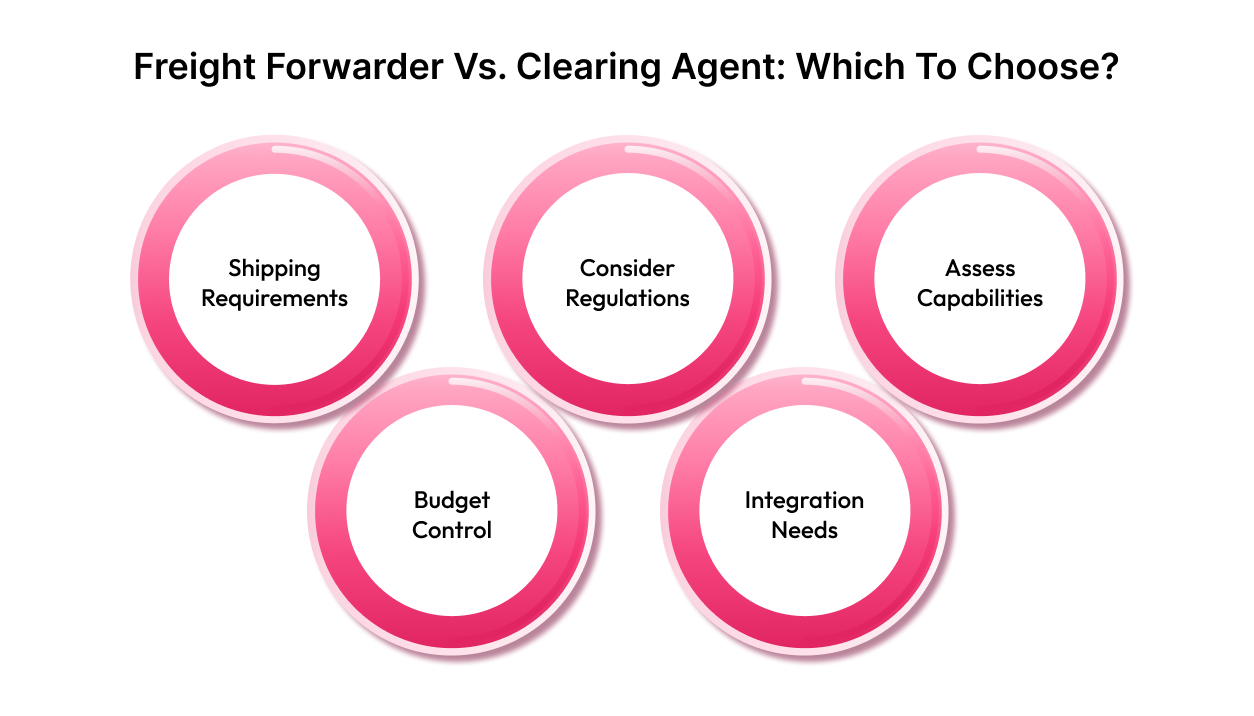
Deciding whether to work with a freight forwarder, a clearing agent, or both depends on your business’s specific shipping needs and the complexity of your supply chain. Here’s how you can make the right choice:
- Evaluate Your Shipping Scope: If you need end-to-end logistics management, including transportation, warehousing, and cargo tracking, a freight forwarder is your go-to partner. For handling customs clearance and regulatory compliance at borders, a clearing agent is essential.
- Consider Regulatory Complexity: When shipping to countries with strict or complicated customs regulations, a licensed clearing agent can help avoid costly delays and penalties.
- Assess Your Internal Capabilities: If your team lacks expertise in customs documentation and duty payments, hiring a clearing agent reduces risk and workload.
- Budget and Cost Control: Freight forwarders often offer bundled services, which can be cost-effective for comprehensive logistics. Clearing agents typically charge separately for customs services.
- Integration Needs: For seamless operations, many businesses partner with freight forwarders that either have in-house clearing agents or strong customs brokerage networks.
By understanding your shipment requirements and compliance challenges, you can choose the right partner to optimize your supply chain, reduce delays, and improve customer satisfaction.
Why Choose Intoglo for India-USA Freight Forwarding & Customs Clearance?
If you want a hassle-free, tech-driven logistics partner for India-USA shipments, Intoglo is built for your needs. Here’s why Intoglo stands out for both freight forwarding and customs clearance:
- Door-to-Door FCL Shipments: End-to-end management, from pickup in India to delivery in 41,000+ US zip codes.
- PAN India Pickup in 24 Hours: Fast cargo collection from anywhere in India.
- Own CFS Space: Secure, dedicated facilities at all major Indian ports.
- Direct Shipping Line Contracts: Guaranteed bookings and special contract rates.
- Expert Customs Brokers: In-house teams ensure smooth, compliant clearance at both ends.
- US Warehousing & Trucking: 50+ warehouses and 40+ trucking partners for flexible storage and delivery.
- Real-Time Tracking & Updates: Instant shipment status, including WhatsApp notifications.
- HS Code Scanner: Get a US-specific HS code in just two clicks with an AI-powered HS code tool.
- Transparent Pricing: Clear quotations with detailed cost breakdowns.
- Customized Solutions: Flexible options for special requirements, including open-top containers and transloading.
Intoglo goes a step further in supporting exporters by providing ready-to-use commercial invoices and packing list templates. These templates help you prepare accurate, compliant shipping documents quickly, minimizing errors and delays during customs clearance.
Request an instant quote today and see how Intoglo can add value to your cross-border shipping operations.
Conclusion
Understanding the differences between freight forwarders and clearing agents is essential for building an efficient, compliant, and cost-effective international supply chain. While freight forwarders manage the entire logistics process, clearing agents specialize in customs clearance and regulatory compliance, both critical for smooth, timely deliveries. Selecting the right partner for each role can help you reduce delays, control costs, and ensure your shipments meet all legal requirements.
If you are looking for a reliable partner to streamline your India-USA FCL shipping and customs processes, Intoglo offers integrated solutions tailored to your business needs. Get speed, reliability, and complete visibility, making your FCL shipping simple and efficient.
FAQs
- What is the difference between a freight forwarder and a clearing agent?A freight forwarder handles the logistics and transportation of goods, while a clearing agent focuses on customs clearance and ensuring compliance with regulations.
- Do I need both a freight forwarder and a clearing agent?Yes, depending on your shipment, a freight forwarder manages transportation and storage, while a clearing agent ensures your goods pass through customs smoothly.
- What services do freight forwarders provide?Freight forwarders coordinate shipping, storage, packaging, and route optimization to ensure efficient movement of goods across international borders.
- What is the role of a clearing agent in international trade?A clearing agent manages the customs clearance process, ensuring that goods meet all regulatory requirements and avoid delays or penalties at the border.


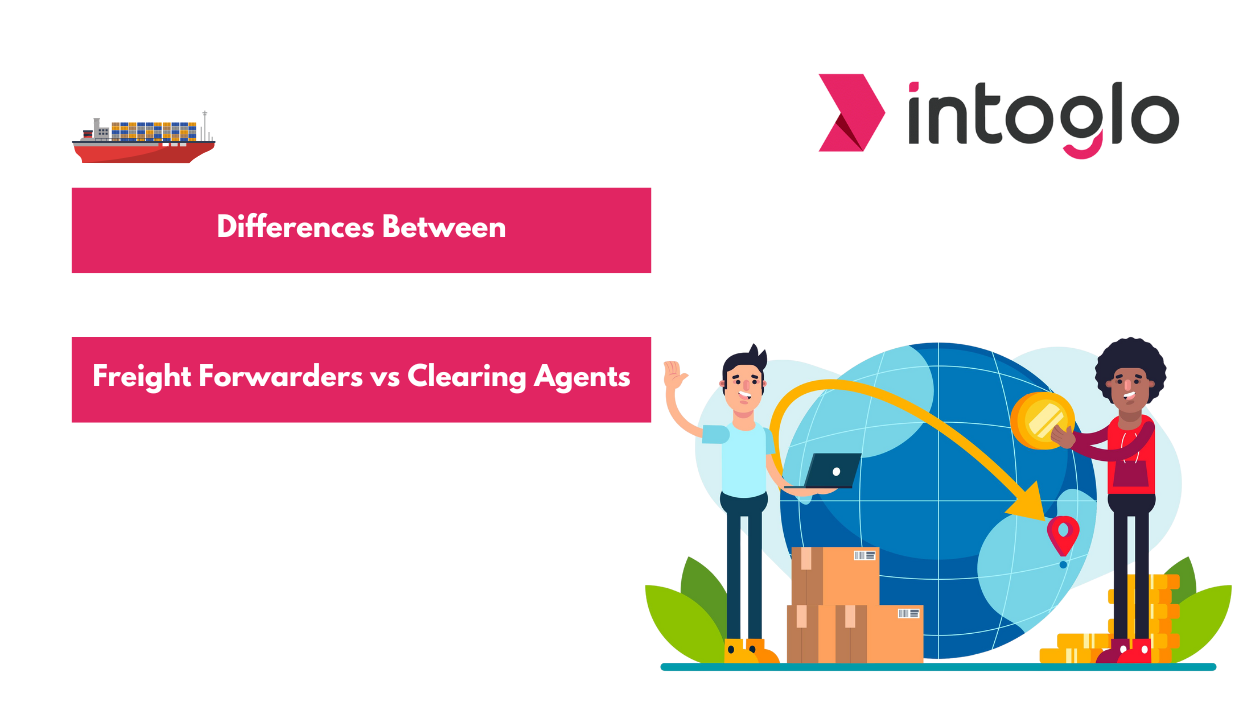
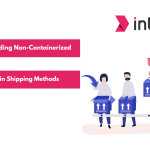

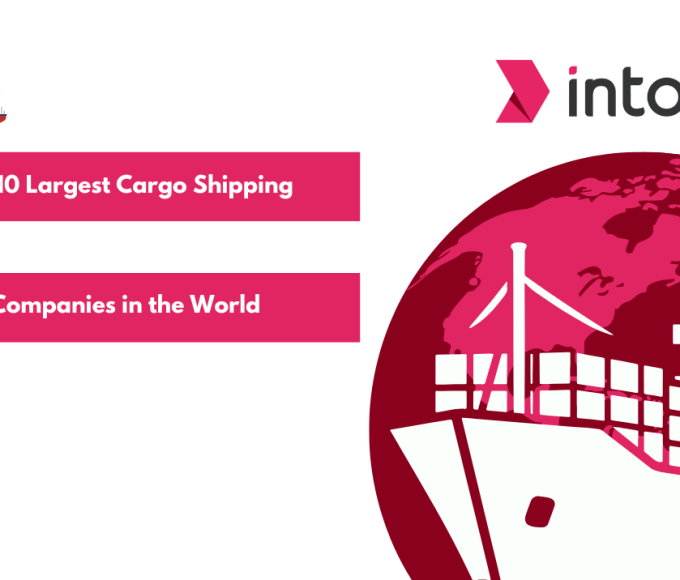
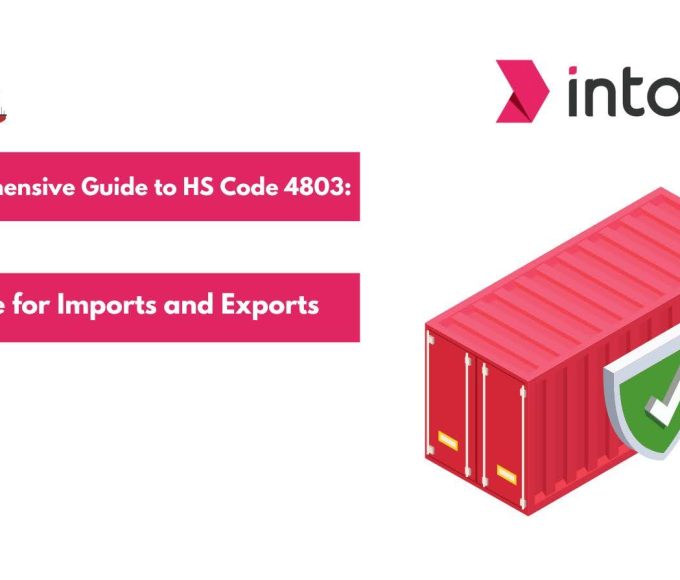
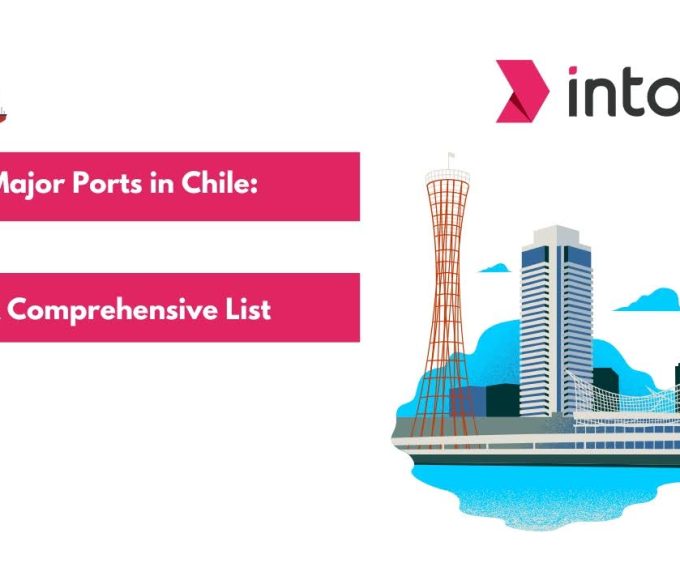
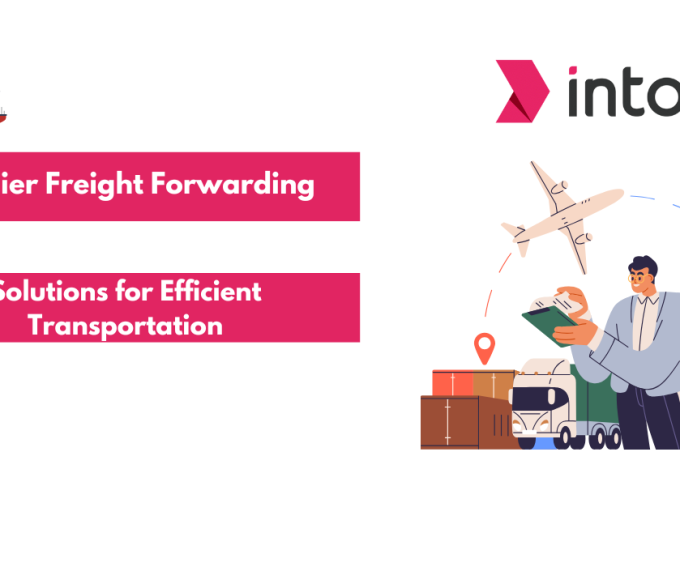
Leave a comment